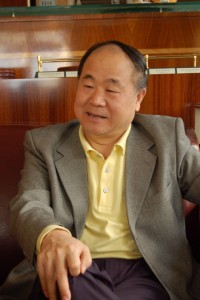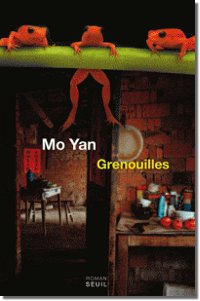 Mo Yan is probably the greatest living writer of Chinese nationality. His latest novel, “Frogs”, is devoted to his aunt ,77 years old, who helped his birth – like 9983 other babies – and, half angel, half-demon, was also responsible for the local birth control policy. As such, she has performed thousands of abortions.
Mo Yan is probably the greatest living writer of Chinese nationality. His latest novel, “Frogs”, is devoted to his aunt ,77 years old, who helped his birth – like 9983 other babies – and, half angel, half-demon, was also responsible for the local birth control policy. As such, she has performed thousands of abortions.
This novel, published in China in 2009, has led to many debates at a time when birth control is discussed openly and even becomes more flexible in some areas (Shanghai), as was able to confirm the writer Xinran, author of “Messages from unknown mothers” (Scribner 2011), a few months ago.
A long term venture, this book is the sixteenth published in France, Mo Yan has been strongly supported by his publishers, including Le Seuil and his translators (Chantal Chen-Andro for this book, Noël and Liliane Dutrait for other novels ).
His aunt Wan the Heart, a male and “red”hero …
Often with Mo Yan, mothers are the main characters, here it is a woman without children. Wan’s father was a doctor with the Eighth Army during the war against Japan and was tracked by the Japanese commander Sugitani, father of the Japanese friend , some years later,of Tadpole (a pen name of the narrator of the book).
The aunt, after graduating, brings more security to deliveries of babies in the area and ruthlessly eliminates the old traditional “matrons”’ and becomes a local heroin.
Her relationships with men were not very happy: her fiance, a handsome pilot, considers that she is “too revolutionary, too serious …not sexy enough” This traitor will soon fly to Taiwan. She refuses to marry later Yang Lin, the Party secretary, an attractive possible husband …
The party is her family, she joins in 1955. In general, the Communist Party is hardly mentioned in Mo Yan’s novels, here it is part of the plot, as the aunt and the narrator Tadpole, her nephew, a member of the army and a playwriter, are members.
As from 1965, the Party is the spearhead of the birth control policy:
“One is not too short, two is just what is needed, three is one too many. “
The aunt becomes a warlord, she handles 2 000 abortions, requires IUDs, vasectomies and tubal ligations and maintains spies to find out unauthorized pregnancies.
A topic that directly affects the author:Tractors are there to destroy houses in retaliation, or a boat to pursue the fugitives. Women fleeing get drowned, others, such as the first wife of Tadpole, die during an abortion.
The tragedy of not having a male heir for these farmers is unacceptable:
“It’s really bizarre, when a woman gives birth to a daughter, the husband shows a face, but a face! But if the cow gives birth to a heifer, his mouth cracks a wide smile. “
But Mo Yan does not mention, as Xinran, murders of baby girls at birth, in order to try again for a boy.
 Birth control is a topic very close to Mo Yan, and he regrets having only a girl and believes that it is not good for her to have been an only child. This policy was an inevitable necessity for China, but only a totalitarian regime was able to impose it and the excesses are not acceptable.
Birth control is a topic very close to Mo Yan, and he regrets having only a girl and believes that it is not good for her to have been an only child. This policy was an inevitable necessity for China, but only a totalitarian regime was able to impose it and the excesses are not acceptable.
The aunt, running away from the frogs:
“Why are the words” baby “and” frogs ” pronounced the same? Why is the cry of a newborn baby just out of the womb quite similar to the croak of a frog? Why is the first ancestor of mankind called Nuwa ? This homophony shows that the first ancestor was a big frog, so that man is related to the the frog. “
Frogs alive or in a dream are important characters, as very often animals with Mo Yan. The frog is a symbol of fertility in many regions and many do not eat frogs “because they are friends of mankind … They host a parasite … those who eat them can become idiots” (not a good sign for us French, portrayed by the English as a frog-eaters !).
Frogs leap after the aunt in her dreams, she faints when she sees one. “Croaking of frogs are crying that resonate,” and these tears are the sorrows and charges of thousands of murdered babies .
A long period of mourning: her long time suitor Qin He and her husband, she has married late in life, Hao large hands, are well known for their carving skills of babies made out of clay, votive offerings of atonement for the aunt, purchased by women hoping for children.
In the region, a company breeding frogs is in fact a cover for a business of recruitment and marketing of surrogate mothers. The body is a commodity and motherhood a trade.In this case, the face of the woman was severely burnt in a fire at a factory and she was inseminated to fund medical expenses for her father injured and without social insurance.
Writing and censorship…Some have criticized Mo Yan as lacking courage and touching the birth control policy only when it was openly discussed. This is putting aside some of his works such as “Explosion” (1985) or “Joy” which address this issue. But if his fiction is a testimony, he is not directly taking sides. Literature must overcome reality.
This novel, is an important step in the work of Mo Yan as stated by Zhang Yinde, professor at Paris-III, during a conference at the Ecole Pratique des Hautes Etudes (EPHE).
For him, after “Life and death are wearing me out”, Mo Yan again surprises us. This novel is marked by five letters to the Japanese friend of Tadpole, the narrator. Letters that demonstrate that some Japanese acknowledge their historic responsibilities in China (although many Chinese avoid mentioning the killings of the Cultural Revolution).
During our conversation of June 2009, Mo Yan told us that he was writing a play in the style of Jean-Paul Sartre, and there it is , 70 pages and nine small parts, and makes us follow the quest for his son by the surrogate mother, and the conflicts with the receiving mother, Little Lion, the wife of Tadpole.
The style is less flamboyant than in his previous novel, but we appreciate lively dialogues and, as always, the humor of the author. Mo Yan is more detached and his narrator holds the characters at some distance, characters somewhat abstract as the author does not provide a physical description.
We are far from a realistic novel or an investigation (as Xinran’s book) and we find no description of childbirth and in particular abortion (this can avoid potential problems with American publishers who are very sensitive to pressure from anti abortion organizations).
Some beautiful pages: the dreams of the aunt and the great description of babies made out of clay. Some breathing space, necessary in a novel that gives the impression of being tightly controlled by the author, perhaps because he is personally very involved.
Bertrand Mialaret
► Mo Yan: “Grenouilles (Frogs)”, translated by Chantal Chen-Andro, Le Seuil – August 2011, 410 pages, € 22.
Photo: Mo Yan in Paris, June 23, 2009 (Pierre Haski/Rue89).





